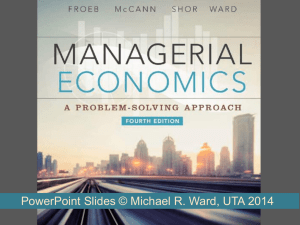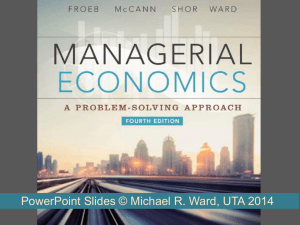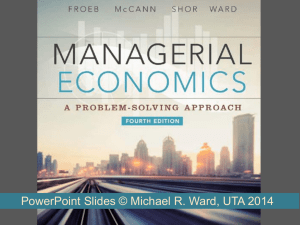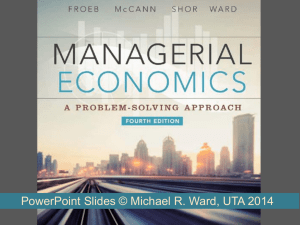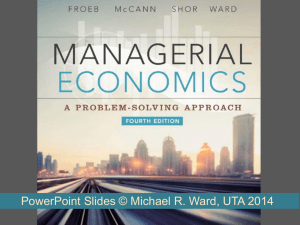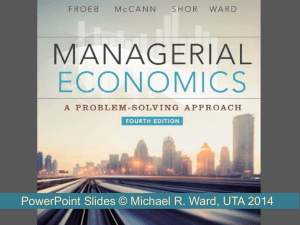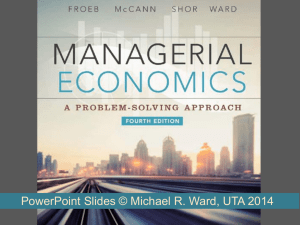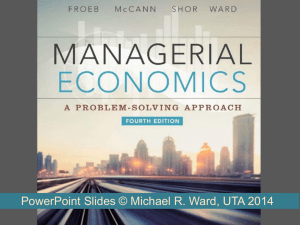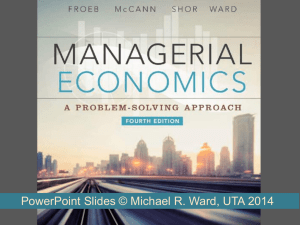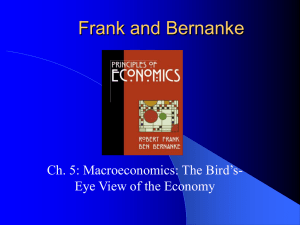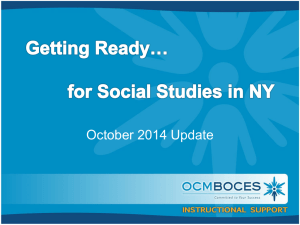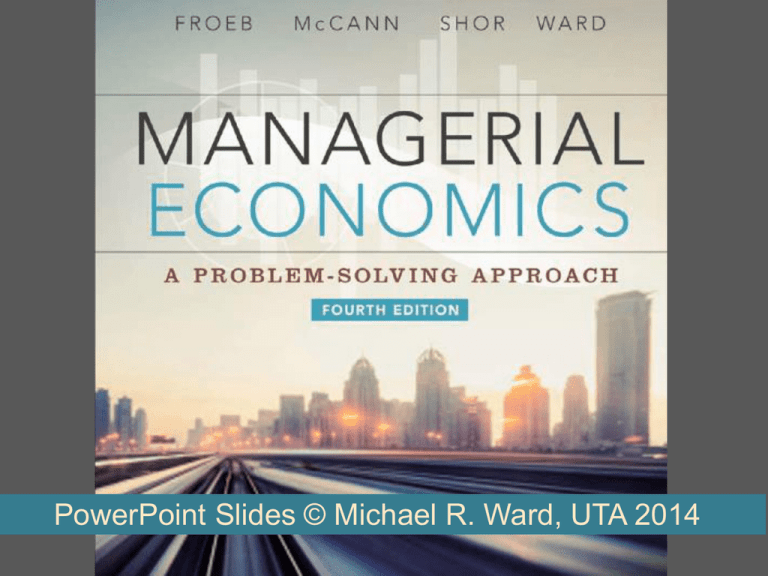
PowerPoint Slides © Michael R. Ward, UTA 2014
Econ 5313
Valentine's Day
• On Valentine's Day, the price of roses increases by more
than the price of greeting cards.
• Why?
• What makes roses and cards different and how does that
affect supply's responsiveness to price?
Econ 5313
Market Definition
Market definition has three dimensions:
1. Geography
2. Product characteristics
3. Timing
Econ 5313
•
•
•
Geography
What level of geography is relevant for the
pharmaceutical retailing market?
What level of geography is relevant for the
pharmaceutical manufacturing market?
What level of geography is relevant for the
pharmaceutical research market?
Econ 5313
•
•
•
•
•
•
Product Characteristics
Often market definition depends on question being asked
and can get subjective
We can talk about the “car market” when addressing
factors that affect all cars (e.g. gas prices)
But are cars by Kia and Lexus “close substitutes?”
If you sell Lexus cars are you more worried about a new
Infiniti dealer of a new Kia dealer?
Is a customer looking at the Infiniti SUV likely to be
interested in a Lexus sedan?
The questions being addressed are different and so the
market definition is different
Econ 5313
•
•
•
•
•
•
Timing
Supply and Demand quantities refer to quantities per
period of time
Sometimes it is easy to substitute across “periods” and
sometimes not
Ex Is a movie showing on Wednesday afternoon a close
substitute for one Saturday night?
Depends on what question we are asking
Does this affect desired staffing levels for the concession
stand?
Does this distinction help you forecast the demand for a
new action picture to be released in two summers?
Econ 5313
Hand Sanitizer
• During the H1N1 flu outbreak, the demand for hand
sanitizer has tripled.
• Should Johnson & Johnson have increased production of
their Purell hand sanitizer?
• Should it have invested in doubling production capacity?
Econ 5313
Pit Experiment
Classroom experiment replicating Chicago Pit
Econ 5313
Shifts in Demand
• Shifts in demand curve can occur for multiple reasons
• Uncontrollable factor: affects demand and is out of a
company’s control
• Income, weather, interest rates, and prices of substitute and
complementary products owned by other companies.
• Controllable factors: affects demand but can be controlled
by a company
• Advertising, warranties, product quality, distribution speed,
service quality, and prices of substitute or complementary
products also owned by the company
• “Hudsucker Proxy” scene on demand and price
movements
Econ 5313
College Park Center
• UT Arlington’s new basketball arena opened in February
2012. This facility can accommodate many other smaller
events such as concerts, high school graduations, and
boxing matches that had been booked at other venues
around the DFW.
• How does this new facility affect the booking fees these
venues can charge?
Econ 5313
Shifts in Supply
Shifts in supply curve usually can be classified into a few
separate reasons
1. Change in the prices of inputs
•
Ex Scarce labor drives wages up. New suppliers compete
materials prices down.
2. Change in productivity
•
Ex Less scrap wasted in production process. Improved
technology requires less labor (or less skilled labor)
3. Change in product characteristics
•
Ex More features. Dropped warranty
4. Change in suppliers
•
Ex New competitor or foreign trade
Econ 5313
Durability and the Car Market
• Cars are lasting longer. The expected number of miles
traveled over a vehicle's life has risen to 180,000 miles in
2001 from 128,000 in 1977
• How does this improved quality affect the demand for
new cars?
• How does this affect the supply of used cars?
• How does this affect the price of used cars?
• How does the price affect of used cars affect the demand
for new cars?
Econ 5313
Comparative Statics
• The power of the Supply and Demand framework is in
determining how equilibrium changes when either supply
or demand shift
• Economists call this “comparative statics”
• First, identify which is shifting
• Second, and harder, identify how big
• When supply shifts up (in) the effect depends on the
steepness or flatness of demand
• When demand shifts up (out) the effect depends on the
steepness or flatness of supply
• Knowing elasticities matters
Econ 5313
at&t/T-Mobile near merger
• On August 31, 2011 at 10:30am, the DOJ Antitrust Division
announced it would seek to block the at&t/T-Mobile
proposed merger. By 11:00am, at&t's share price fell by
4% on the news, but the share price of its competitor,
Sprint, rose by 6%.
• Why is a firm not a party to the merger affected?
• Are at&t, T-Mobile and Sprint substitutes?
• If the merger would have only raised prices, what would
have happened to demand for Sprint’s service?
• Since Sprint’s market value rose when the merger was
blocked, what did “the market” think the effect of the
merger would have been on mobile prices?
Econ 5313
Equilibrium as a Process
• Economists can get sloppy taking about equilibrium.
• We know that: 1) supply and demand are always shifting
around and 2) often there is not just one price.
• What does equilibrium mean then?
• But talking as if there is a well defined equilibrium usually
does no harm and facilitates discussion
• Also misses the point. Better to think of equilibrium in
terms of the forces at work to consummate all wealth
creating transactions
• “All models are wrong, but some are useful”
Econ 5313
Supply or Demand?
• Over the past decade, the price of computers has fallen,
while quantity has risen. Why?
• In last few years, US manufacturing firms have begun to
abandoned outsourcing projects in China. Why?
• Over the past generation or more, the university tuition
increases have outpaced inflation. Why?
Econ 5313
Information in Prices
• Prices are a primary ways that market participants
communicate with one another
• Buyers signal their willingness to pay, and sellers signal
their willingness to sell with prices
• Price information especially important in financial markets
• More exotic?
• Ex Internal markets for products (HP, Lilly, Microsoft)
• Ex Prediction markets (Intrade) (IEM) (Inkling)
• Ex Terror markets? (DoD)
Econ 5313
Market Makers
• What do “market makers” in financial markets do?
• They are the conduit through which buyers find sellers
• Buyer willing to pay 8.375 and seller willing to accept
8.250 means that the market maker can earn the “spread”
(0.125 = 8.375-8.250) on the transaction
• If the spread is higher, they earn more per transaction
Econ 5313
Market Makers
• For this “instantaneous” demand and supply for a stock
what prices and quantity would the market maker
choose?
Econ 5313
Market Makers
• Easier to see in tabular form:
Bid
Ask Quantity Profit
$8
$8
5
$0
$7
$9
4
$8
$6
$10
3
$12
$5
$11
2
$12
$4
$12
1
$8
• What is the market maker’s optimal “spread?”
• What if other market maker’s could enter with an MC of
$2 per transaction?
Econ 5313
No “odd-eighths” Trading
• On May 26, WSJ & LA Times published results of Bill
Christie’s research
• On May 27, spreads collapsed. What happened?
Econ 5313
Other Market Makers
• In general, anyone who brings buyers and sellers together
is a “Market Maker.”
•
•
•
•
Example Real Estate Agent
Example Ebay
Example Expedia
Example Department Store
• The “Distributive Trades” serve a valuable function and
are rewarded based on the “bid-ask spread.”
• Disparaged as mere “middlemen”
• Relentless drive to reduce spread has made fortunes for
many entrepreneurs
Econ 5313
•
•
•
•
•
•
From the Blog
Chapter 8
Some Economics of Sex
When supply fixed, demand causes prices to rise
“The Bet”
Uber
The ROBOT Act
Econ 5313
Main Points
• Market definition has three components
• Geography, Product Characteristics and Timing
• Price decreases cause increases in the quantity demanded
• a movement along a demand curve
• Other factors, e.g. income, can cause a change in demand
• a shift in the demand curve
• Price decreases cause decreases in the quantity supplied
• a movement along a supply curve
• Other factors, e.g. costs, can cause a change in supply
• a shift in the supply curve
Econ 5313
Main Points
• Market equilibrium is the price at which supply equals
demand
• You can also think of equilibrium as the process whereby
demanders and suppliers do not change their behavior
• Prices convey valuable information very cheaply
• Hence prediction markets
• “Making” a market is costly
• “Middlemen” bear these costs to bring demanders and suppliers
together
• Much of the technological advances have been in improving the
efficiency of these activities.

